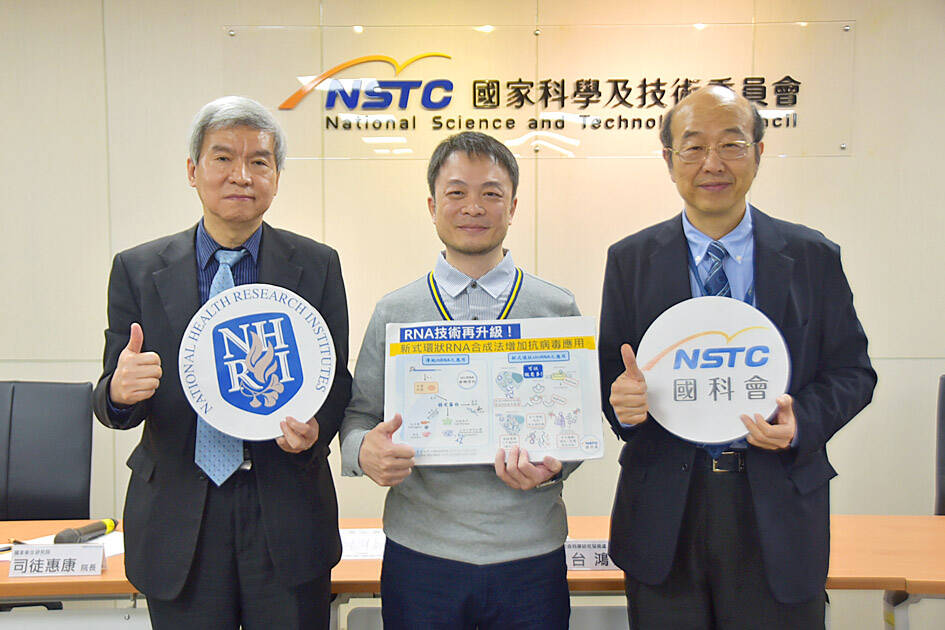Taiwanese scientists have discovered a new way to synthesize circular RNA (circRNA), which could be applied to vaccine development, the National Institute of Infectious Disease and Vaccinology told a news conference yesterday.
Linear RNA is inherently unstable so using it in mRNA vaccines requires that the vaccines be stored and deployed in specific conditions to avoid degradation and loss of effectiveness, institute scientists said.
CircRNA eliminates its linear counterpart’s instability without compromising the ease of modification and editing that make mRNA vaccines possible, said institute associate researcher Yu Chia-yi (余佳益), who headed the research.

Photo: Wu Po-hsuan, Taipei Times
The potential of applying circRNA in vaccine development is limited by the mechanisms used to synthesize the substance, including bacteriophage and splicing-based processes, he said, adding that the current synthesis methods have significant drawbacks, such as inefficiency, low-purity products and unwanted RNA fragments.
The research team discovered a novel method that uses ligase ribozymes to trigger linear RNA into autonomously folding itself, enabling the efficient production of high-purity circRNA, he said.
The study also discovered that circRNAs with a singular internal ribosome entry site could cause the translation of interferon, a class of proteins secreted by the body to suppress viral reproduction, Yu said.
Additionally, the research team found that specifically guided RNA allowed circRNA expressing cas13 ribonuclease to effectively “snipe” the corresponding RNA virus, suggesting a new concept for viral treatments, he said.
The institute said the findings have implications for mRNA-based vaccine design and production.
The study was published in the journal Nature Communications in August last year.

CHANGING LANDSCAPE: Many of the part-time programs for educators were no longer needed, as many teachers obtain a graduate degree before joining the workforce, experts said Taiwanese universities this year canceled 86 programs, Ministry of Education data showed, with educators attributing the closures to the nation’s low birthrate as well as shifting trends. Fifty-three of the shuttered programs were part-time postgraduate degree programs, about 62 percent of the total, the most in the past five years, the data showed. National Taiwan Normal University (NTNU) discontinued the most part-time master’s programs, at 16: chemistry, life science, earth science, physics, fine arts, music, special education, health promotion and health education, educational psychology and counseling, education, design, Chinese as a second language, library and information sciences, mechatronics engineering, history, physical education

The High Prosecutors’ Office yesterday withdrew an appeal against the acquittal of a former bank manager 22 years after his death, marking Taiwan’s first instance of prosecutors rendering posthumous justice to a wrongfully convicted defendant. Chu Ching-en (諸慶恩) — formerly a manager at the Taipei branch of BNP Paribas — was in 1999 accused by Weng Mao-chung (翁茂鍾), then-president of Chia Her Industrial Co, of forging a request for a fixed deposit of US$10 million by I-Hwa Industrial Co, a subsidiary of Chia Her, which was used as collateral. Chu was ruled not guilty in the first trial, but was found guilty

Taiwan-based publisher Li Yanhe (李延賀) has been sentenced to three years in prison, fined 50,000 yuan (US$6,890) in personal assets and deprived political rights for one year for “inciting secession” in China, China's Taiwan Affairs Office spokesman Chen Binhua (陳斌華) said today. The Shanghai First Intermediate People’s Court announced the verdict on Feb. 17, Chen said. The trial was conducted lawfully, and in an open and fair manner, he said, adding that the verdict has since come into legal effect. The defendant reportedly admitted guilt and would appeal within the statutory appeal period, he said, adding that the defendant and his family have

DEADLOCK: As the commission is unable to forum a quorum to review license renewal applications, the channel operators are not at fault and can air past their license date The National Communications Commission (NCC) yesterday said that the Public Television Service (PTS) and 36 other television and radio broadcasters could continue airing, despite the commission’s inability to meet a quorum to review their license renewal applications. The licenses of PTS and the other channels are set to expire between this month and June. The National Communications Commission Organization Act (國家通訊傳播委員會組織法) stipulates that the commission must meet the mandated quorum of four to hold a valid meeting. The seven-member commission currently has only three commissioners. “We have informed the channel operators of the progress we have made in reviewing their license renewal applications, and